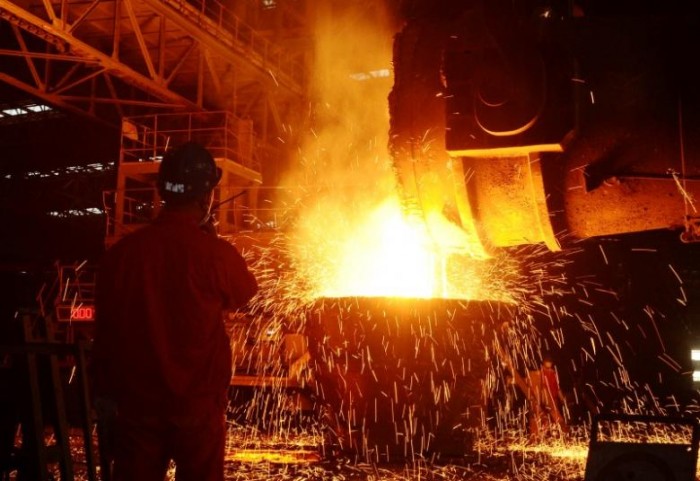
- Reuters reports that China will use the stricter enforcement of environmental, safety and energy efficiency standards as well as tougher credit controls to help fight against overcapacity in key industrial sectors, the government said. The world's second-largest economy has identified overcapacity as one of its key challenges and it has already pledged mass closures in the steel and coal sectors, but it has so far fallen behind on its targets. The Ministry of Industry and Information said on Friday in a draft policy document published on its website (www.miit.gov.cn) it would "normalize the stricter implementation and enforcement of mandatory standards" to tackle overcapacity in sectors such as steel, coal, cement, glassmaking and aluminum.It would implement a "differential credit" policy that would allow lenders to extend loans to help firms restructure while cutting off funding for poorly performing enterprises targeted for closure.
- Bloomberg reports that China's slowing growth in money supply hasn't affected the economy and the nation's fundamentals support a stable foreign-exchange rate, the top economist at the central bank's research bureau said.The country's stabilizing hoard of foreign reserves, which were little changed at $3.201 trillion in July from the previous month, signal the exchange rate is near equilibrium, Ma Jun, chief economist of the People's Bank of China's research bureau, wrote in a note Saturday. He added China's corporate debt was high by international standards and that it should reduce the leverage by cleaning up "zombie" companies and implementing debt-to-equity swaps. Ma's remarks came after official data on Friday indicated that a recent economic stabilization faltered in July, with factory output, retail sales and investment all missing estimates, and the broadest measure of new credit rising at the slowest pace in two years. He pointed to the International Monetary Fund's forecasts for China's growth as a sign of confidence in the world's second-largest economy.
New York Times reports that Harry Wu, who spent 19 years in Chinese labor camps, was a familiar figure on Capitol Hill, delivering searing broadsides against China's authoritarian government that drew admiration from American politicians condemning the country's human rights abuses.His close relationship with lawmakers helped Mr. Wu secure a $17 million grant from Yahoo in 2007 to aid families of persecuted dissidents, when the tech giant was facing withering criticism for assisting the Chinese authorities in identifying activists who had used the company's email service.But by the time Mr. Wu, 79, died in April, his legacy had become tarnished. He provided just $1.2 million to dissidents' families, while spending more than $13 million of the Yahoo money to operate his own foundation, which runs a website and a small museum, according to financial disclosures, court documents and interviews with former employees, foundation board members and human rights advocates."American politicians think of Harry Wu as a hero, but the truth is he is an immoral person who betrayed the very people he was supposed to be helping," said Wang Jing, 47, the wife of a dissident. In a letter released days after his death, seven prominent dissidents in China called on American officials to investigate what they described as spending irregularities by the organization, the Laogai Research Foundation, and announced plans to file a lawsuit seeking that the roughly $3 million that remained from Yahoo's original grant be given to another group.
- 2016-08-12 How the China Shock, Deep and Swift, Spurred the Rise of Trump
- 2016-08-11 Here’s how the South China Sea ruling affects U.S. interests
- 2016-08-10 Exclusive: Vietnam moves new rocket launchers into disputed South China Sea - sources
- 2016-08-09 China’s Limited Retaliation Options Against the THAAD Deployment in South Korea
- 2016-08-08 The Rio Olympics are really hurting China’s feelings
- 2016-08-05 Meet the China ‘whisperers’ who get the big deals done in Silicon Valley
- 2016-08-03 China, Not Silicon Valley, Is Cutting Edge in Mobile Tech
- 2016-08-02 Japan Slams China Over Sea Strategy
- 2016-08-01 Uber Sells China Operations to Didi Chuxing
- 2016-07-31 'Give them a bloody nose': Xi pressed for stronger South China Sea response
- Bloomberg China Could Soon Let Passengers Use Wi-Fi on Planes
- The Guardian Japan to develop missile as tensions with China mount – reports
- Reuters The sinking feeling in China's overmined regions
- Bloomberg Bulls and Bears Collide as 'China's Twitter' Surges to Record
- Financial Times China lenders look at social media contacts to assess risk
- San Francisco Chronicle SF's hottest ticket: China's epic 'Dream of the Red Chamber'
- The Diplomat Deterring China: Japan to Develop New Anti-Ship Missile for Defense of Senkakus
- nationalinterest.org Report: China Could Make a Big Move in the South China Starting Next Month
- Wall Street Journal China's Economic Slowdown
- Financial Times India and China reset links at key time
- qz.com The looming public health crises threatening to take down China's health care system
- Forbes Hacking Attack At Vietnam Airports Another Chapter In South China Sea Dispute
